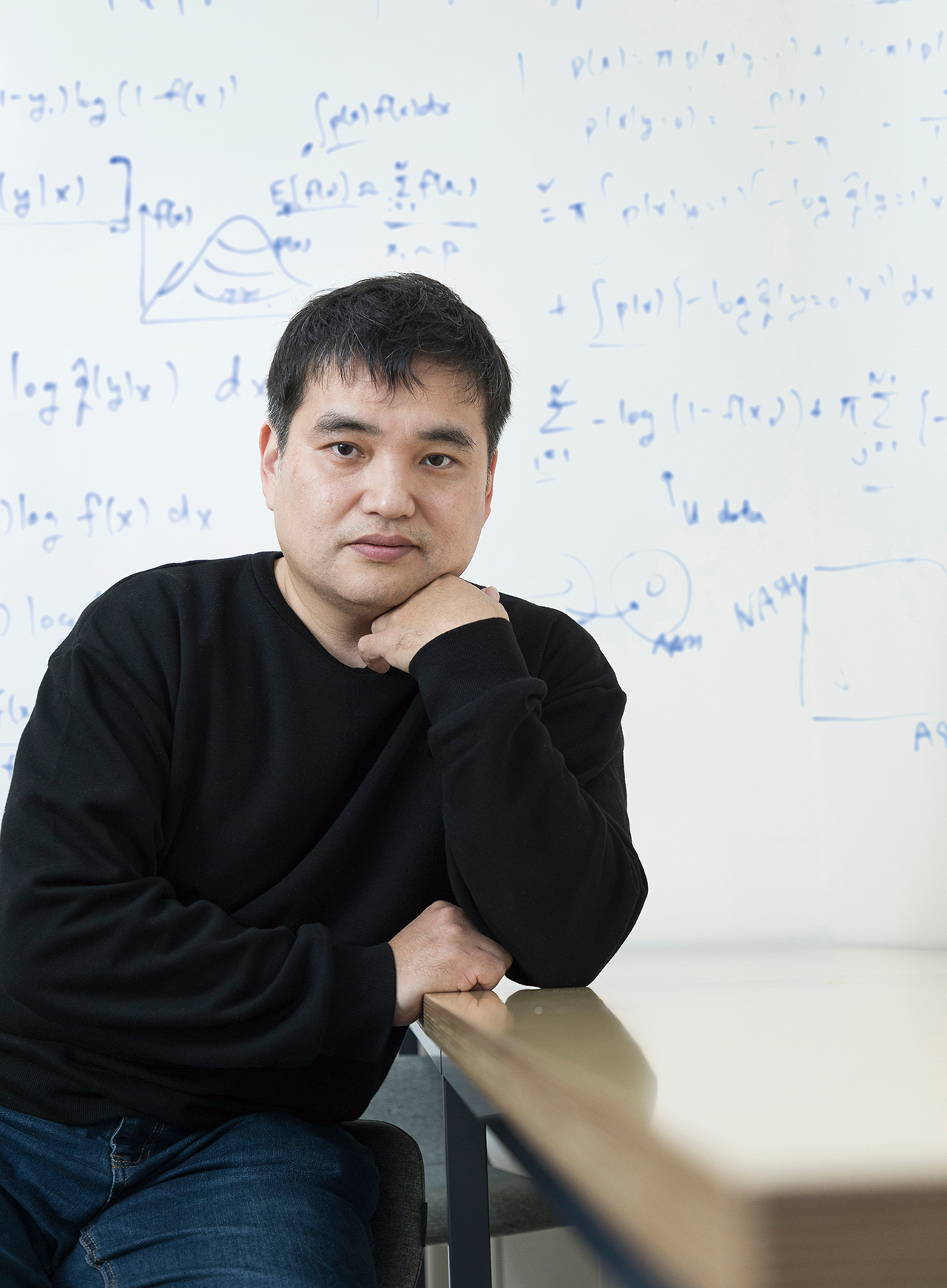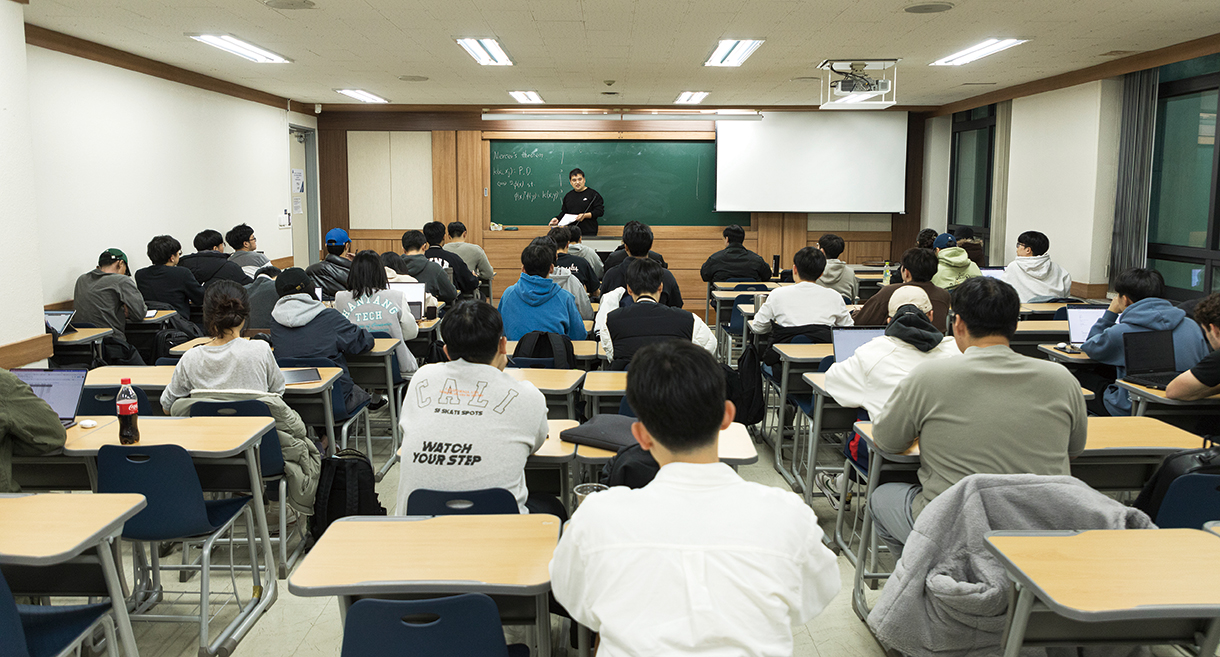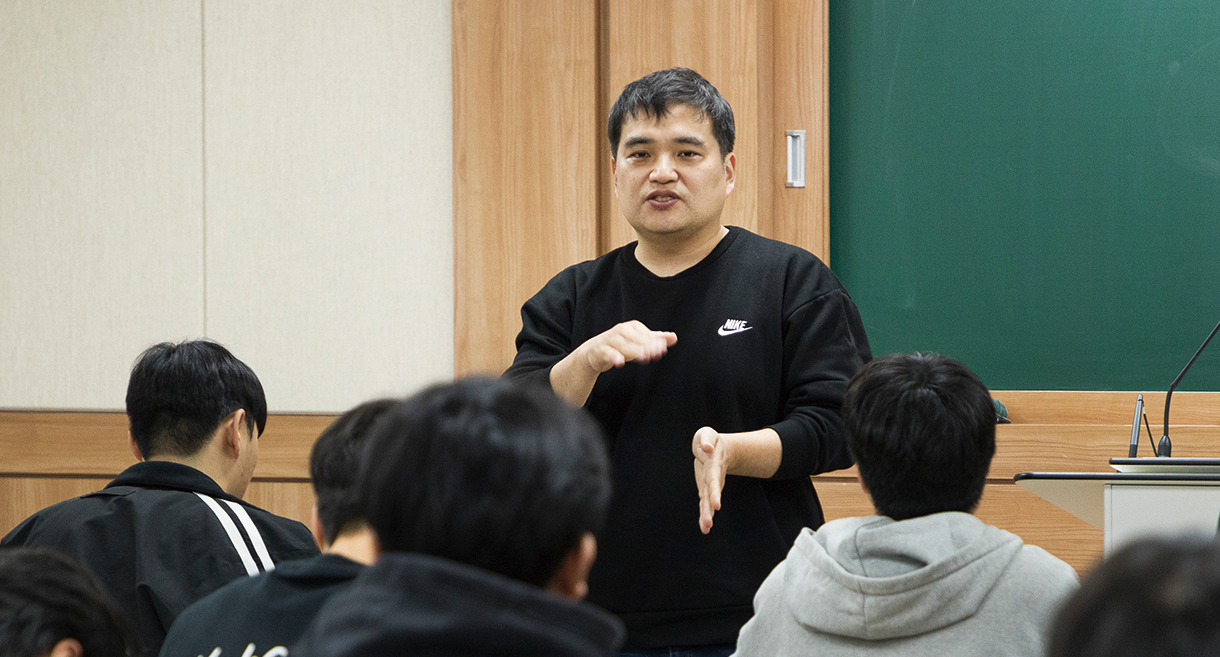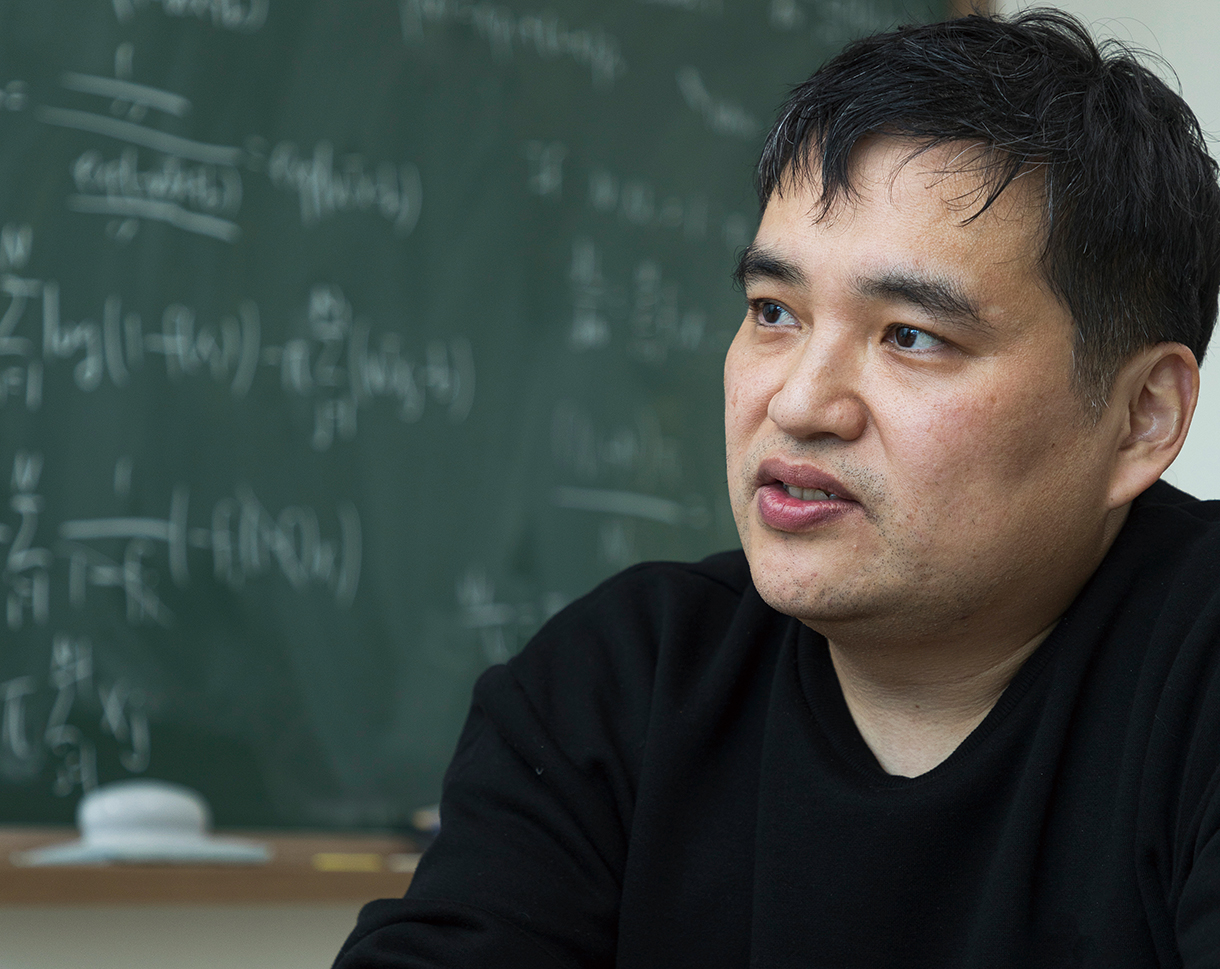

Story
탄탄한 수학적 원리 위에서 연구,
AI 윤리의식도 고양해야
Research Based on Solid Mathematical Principles,
With High Awareness of AI Ethics
컴퓨터소프트웨어학부 노영균 교수
Prof. Yung-Kyun Noh, Department of Computer Science
- 글 박영임
- 사진 이현구
- Writing Park Yeong-im
- Photograph Lee Hyeon-gu
Scroll Down
As artificial intelligence (AI) is introduced into various industrial fields, the importance of education on it is becoming greater. In response to these demands of the times, Hanyang University has set out to foster talent for future based on systematic artificial intelligence education. We met with Professor Yung-kyun Noh, the head of the Department of Artificial Intelligence, the Department of Artificial Intelligence Application, and the Department of Intelligence and Convergence, to talk about what values we need to develop in preparation for the era of artificial intelligence.

이론부터 응용까지, 다양한 스펙트럼의 과정 구성
“인공지능은 다양한 산업 분야에서 생산성을 높여줄 새로운 기술입니다. 컴퓨터와 핸드폰이 출시되면서 산업이나 서비스, 일하는 방식, 여가생활 등 많은 부분이 바뀌었지만, 어느 순간 자연스럽게 일상에 녹아들었죠. 우리의 미래를 바꿔 갈 인공지능 역시 그와 같을 것입니다.”
머지않아 인공지능에 의해 많은 직업군이 사라질 것이란 전망이 제기되며 인공지능을 일자리를 빼앗는 위협적인 존재로 보기도 한다. 하지만 인공지능 시대에는 그만큼 새로운 일자리가 생겨날 전망이다. 기업체에서는 이미 발 빠르게 필요 인력 수급에 공을 들이고 있다. 인공지능 전문인력을 시급하게 육성해야 한다는 목소리도 높다. 고용노동부 역시 향후 5년간 인공지능 분야에서 1만 2800명의 인력이 부족할 것이라고 예상했다.
이런 흐름에 따라 각 대학은 인공지능 관련 학과를 개설하거나 인공지능 전문 대학원을 신설하고 있다. 물론 일반 학과에서도 인공지능 관련 수업이 증가하는 추세다. 일찍이 인공지능의 파급력을 예상한 한양대 역시 학부와 대학원에 인공지능 과정을 개설했다. 서울캠퍼스의 컴퓨터소프트웨어학부, ERICA캠퍼스의 인공지능학과, ICT융합학부 등이 학부 과정으로 설치돼 있다. 일반대학원 과정으로는 컴퓨터·소프트웨어학과, 인공지능학과, 인공지능융합학과 등을 개설했다. 여기에 기업체와 연계한 계약학과로 AI응용학과(KT), 지능융합학과(LG전자)를 석사과정으로 운영하고 있다. 특수대학원인 인공지능융합대학원 인공지능시스템학과도 신설했으며, 지난 5월에는 국가 지원을 통해 인공지능 반도체 대학원을 설립했다.
“한양대는 다양한 과에 인공지능 관련 수업을 개설하고 있습니다. 컴퓨터소프트웨어학부의 경우 기초부터 응용과정까지 2학년 때부터 단계를 밟아갈 수 있도록 커리큘럼을 개편했죠. 그래서 초창기에 4학년 응용 과목으로 개설됐던 ‘인공지능개론’ 과목이, 3학년으로 내려갔다가 지금은 2학년 때 수강하는 것으로 바뀌었습니다.”
이렇게 조정한 이유는 학생들이 더 일찍 인공지능 과목을 접하게 하기 위해서다. 그 결과 3학년 이후부터 자신이 원하는 분야를 조금 더 심도 있게 공부할 수 있게 됐다. 한편, 인공지능융합대학원은 온라인 중심의 스마트 교육을 기반으로 인공지능의 기초 이론과 응용 분야를 조화롭게 교육하고 있다. 기초 수학부터 시작해 다양한 트랙에 따라 수업을 선택해 들을 수 있도록 디자인했다. 다양한 관심사를 가진 학생들을 위해 설립됐으므로, 각자 원하는 수업을 들을 수 있게 설계한 것이다.
“인공지능의 범위는 넓습니다. 이론적인 부분에 관심이 많다면 학습이론, 확률론 같은 과목 위주로 공부하고, 응용 분야에 관심이 있다면 머신러닝의 기초를 학습한 후 비전, 언어, 추천, 로봇 제어 등을 분야별로 심화할 수 있습니다.”
A wide spectrum of courses from theory to application
“Artificial intelligence is a new technology that will increase productivity in various industrial fields. With the introduction of computers and mobile phones in the late-20th century, many changes occurred in industry, services, the way we work, and enjoy leisure activities — and at some point, they naturally became part of our daily lives. Artificial intelligence, which will change our future, will be the same.”
There are predictions that many occupations will disappear due to AI, and some view it as a threat that will take away our jobs. However, lots of new jobs will be created in the era of AI. Businesses are already working hard to secure the necessary manpower. There are also opinions calling for an urgent need to foster experts in artificial intelligence. The Ministry of Employment and Labor also predicts that there will be a shortage of 12,800 workers in the next five years in the field of artificial intelligence.
Following this trend, universities are opening AI-related departments and establishing graduate schools specializing in artificial intelligence. Naturally, the number of AIrelated courses is increasing also in other departments. Hanyang University, which anticipated the impact of AI early on, had also established artificial intelligence courses in its undergraduate and graduate schools. The undergraduate programs include the Department of Computer Science at the Seoul Campus, and the Department of Artificial Intelligence and the Division of Media, Culture, and Design Technology. Graduate school programs include the Department of Computer Sciences, the Department of Artificial Intelligence, and the Department of Applied Artificial Intelligence. In addition to the above, there are departments with Master’s programs linked to companies: the Department of Artificial Intelligence Application (KT) and the Department of Intelligence and Convergence (LG Electronics). The Department of Artificial Intelligence Systems was recently established at the Graduate School of Applied Artificial Intelligence, a special graduate school. In May, the AI Semiconductor Graduate School was established through government support.
“Hanyang University is offering AI-related classes in various departments. For the Department of Computer Science, the curriculum was reorganized so that students can learn from the basic to applied courses beginning from their second year. For this reason, the Introduction to Artificial Intelligence course, which was initially offered as an applied course for fourth year students, became a third year course, and is now a second year course.”
The reason for this adjustment was to allow students to experience AI courses earlier on. As a result, students are able to study the field they are interested in with more depth. Meanwhile, the Graduate School of Applied Artificial Intelligence teaches the basic theories and applications of AI harmoniously based on online-centered smart education. The courses are designed so that students can choose classes according to diverse tracks, starting from basic mathematics. It was established for students with diverse interests, and designed for each student to take the classes they want.
“The scope of artificial intelligence is wide. If you are interested in theoretical aspects, you can focus on studying subjects such as learning theory and probability theory — and if you are interested in applications, you can learn the basics of machine learning and take in-depth courses in each field, such as vision, language, recommendations, and robot control.”

수학적 원리에 대한 이해 높여야
노영균 교수는 인공지능 분야에서 활약하고자 하는 학생이라면 급변하는 인공지능 기술 자체보다 인공지능 알고리즘의 기반이 되는 원리를 탄탄하게 익히는 것이 중요하다고 강조했다. 선형대수, 확률, 통계 같은 수학적 원리가 향후 산업계에서 활약할 시기가 되었을 때 유행할 알고리즘을 이해하고 사용하는 데 기반이 되기 때문이다.
“알고리즘을 사용하는 방법은 학원에서도 배울 수 있습니다. 그보다는 그 아랫단에서 수학적 원리가 어떻게 적용되고, 데이터와 어떻게 연관되는지를 아는 것이 더 중요합니다. 그리고 추가로 강조하고 싶은 점은 이론부터 응용까지의 스펙트럼을 폭넓게 경험하라는 것입니다. 기술은 빠르게 변하고 있습니다. 스펙트럼이 넓어야 기술이 바뀌어도 유연하게 대응할 수 있고, 더 나아가 변화를 선도하는 인재가 될 수 있습니다.”
노영균 교수는 새로운 기술이 출시됐을 때, 기술의 사용자 입장에서도 적극적으로 사용해 볼 것을 권했다. 그것도 정해진 방식이 아니라 자신의 방식대로 사용하거나 새로운 방식을 시도해 보는 것이 좋다. 그러한 과정을 통해 서비스를 제공하는 기업도 생각하지 못한 새로운 서비스에 대한 아이디어를 발굴할 수 있다. 또한 인공지능 시대의 인재들이 갖춰야 할 덕목으로 도덕심을 강조했다.
“이용자에게 완벽한 도덕심을 기대하기는 어렵습니다. 따라서 이득이 다소 감소하더라도, 알고리즘 개발자 입장에서 알고리즘이 도덕적인 범위에서 사용될 수 있도록 제약하는 장치를 마련해야 합니다. 개인이나 특정 집단의 이익과 사회적 가치가 대립할 때 어느 쪽을 추구할 것인지, 인공지능을 개발하는 사람이라면 다양한 상황을 가정하며 고민해 볼 문제입니다. 한양대는 인공지능 관련 학과들에 법규나 철학에 대한 과목을 개설하고 관련 세미나를 계획하고 있습니다.”
Improve your understanding of mathematical principles
Professor Yung-kyun Noh emphasized that for students who want to work in the field of artificial intelligence, it is important to learn the principles underlying artificial intelligence algorithms, rather than the technology itself that changes rapidly. The mathematical principles such as linear algebra, probability, and statistics are the basis for understanding the algorithms that will be popular when they become active in the industry in the future.
“You can learn how to use algorithms even at private institutes. What is more important is to know how the underlying mathematical principles are applied and related to the data. What I would like to further emphasize is for students to experience the wide spectrum from theory to application. Technology changes rapidly. Only when your spectrum is wide, will you be able to respond flexibly to the changing technology, and become a leader in these changes.”
Professor Noh recommends that students actively utilize new technologies when they are released. It is also better to apply them in the way they are meant to be used, but in their own ways, or new ways. Through such processes, they may be able to discover ideas for new services that not even the service providers thought of. In addition, he emphasized morality as a virtue that talent in the artificial intelligence era must possess.
“It is difficult to expect users to have a perfect sense of morality. Therefore, algorithm developers must establish a restriction mechanism so that the algorithm can be used within a moral range, even if its benefits are somewhat reduced. AI developers must reflect on which side to pursue when the interests of an individual or a specific group conflict with social values, considering various situations. Hanyang University has opened courses on laws and philosophy in AI-related departments and is planning related seminars.”

인공지능 분야는 빠르게 변하고 있다. 기술 자체보다 인공지능 알고리즘의 기반이 되는 원리를 탄탄하게 익혀 자신의 스펙트럼을 넓히는 것이 중요하다
The field of artificial intelligence is changing rapidly. It is important to widen your spectrum by gaining a thorough understanding of the principles underlying AI algorithms, rather than the technology itself.

인공지능의 다양한 세계 경험하기를
노영균 교수는 인공지능이 인류의 진보에 기여할 수 있기를 바란다. 그래서 특히 의학 분야를 포함한 기초 과학 연구자들과 활발히 협업하고 있다. 지난 2021년 미국 메이요클리닉과 함께 머신러닝을 이용해 구분이 쉽지 않은 간 질병을 분류하는 기술을 개발한 바 있다. 이 외에도 딥러닝 등 인공지능 기술을 활용해 MRI 상 턱관절 변위 등을 진단하는 기술과 관상동맥질환의 위험도를 계층화하는 인공지능 모델도 개발했다.
이와 더불어 최근에는 고등과학원과 함께 인공지능으로 단백질의 3차원 구조를 예측하는 기술을 연구 중이다. 신약이나 환경 문제를 해결할 새로운 고분자 물질을 개발하는 데 도움을 줄 수 있는 연구로 기대를 모은다.
이렇게 인공지능을 활용해 다양한 분야의 연구를 진행하고 있는 노영균 교수. 그는 학생들에게도 여러 가능성을 열어놓으라고 조언했다. 자신의 한계를 미리 한정할 필요 없다는 것이다.
“처음에는 하나의 관심사로 인공지능 공부를 시작할 수 있습니다. 특정 애플리케이션, 특정 알고리즘, 혹은 알고리즘을 구현하는 특정 툴킷에 관심이 생겨 인공지능 공부를 시작했다 하더라도 점차 관심의 범위가 자연스럽게 넓어질 겁니다. 소위 전망이 좋다고 이야기되거나 미디어가 제시하는 길로, 자신이 가야 할 미래나 앞날에 대한 계획을 한정 짓지 말았으면 좋겠습니다. 우리 앞에는 다양한 미래가 있을 수 있으니까요. 취업이든, 창업이든, 연구자의 길이든 자신이 어느 쪽에 재능이 있는지 아직 모릅니다. 모든 가능성을 열어놓고 많은 경험을 하며 적극적으로 정보를 모으길 바랍니다.”
Experience the diverse world of artificial intelligence
Professor Yung-kyun Noh hopes that artificial intelligence can contribute to the advancement of humanity. For this reason he actively collaborates with researchers in basic sciences, especially in the medical science field. In 2021, he developed technology to classify liver diseases that are difficult to distinguish using machine learning, together with Mayo Clinic in the United States. In addition, he also developed technology to diagnose temporomandibular joint dislocation through MRI, and an AI model to stratify the risk of coronary artery diseases, using AI technologies such as deep learning.
Furthermore, he is currently researching technology to predict the three-dimensional structure of proteins using AI, jointly with the Korea Institute For Advanced Study. Expectations are high for his research that can help develop new drugs or new polymer materials that will solve environmental problems.
In this way, Professor Noh is conducting research in various fields using artificial intelligence. He also advises his students to be open to many possibilities. They do not need to define their limitations now.
“At first, you may start studying artificial intelligence because of one interest. Even if you started studying AI because you were interested in a certain application, a specific algorithm, or a specific toolkit that implements an algorithm, your interest will naturally expand over time. I hope you do not limit your future plans to what is said to be promising, or what the media suggest. There can be various possibilities in the future. You do not know what your talent is, whether it’s getting a job, starting a business, or becoming a researcher. I hope that you will be open to all possibilities, have many experiences, and actively gather information.”

